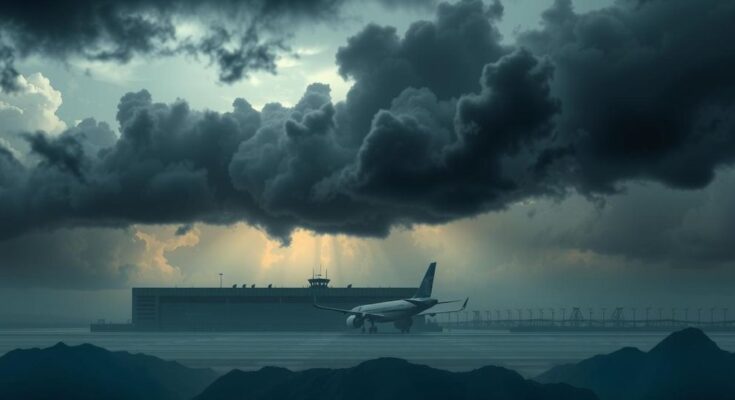Goma is on the brink of collapse as Rwandan-backed M23 fighters have captured the airport, exacerbating a humanitarian crisis. The ongoing conflict has led to significant civilian displacement and dire conditions in the city. Protests in Kinshasa illustrate the growing frustration over international responses, as calls for diplomatic intervention intensify amid rising tensions in the region.
On Tuesday, armed fighters supported by Rwandan troops captured the airport in Goma, a city in eastern Democratic Republic of Congo (DRC), increasing concerns for its stability. This takeover is perceived as a significant setback for Congolese forces, which are struggling against the Tutsi-led M23 group that has advanced through the region in recent weeks. Intense fighting in Goma has created a humanitarian crisis, with hospitals overwhelmed and bodies reported in the streets.
A security source revealed to AFP that over 1,200 Congolese soldiers have surrendered and are currently confined to a UN base at the airport. The ongoing conflict marks a severe escalation in a region that has long been plagued by violence attributed to various armed groups, exacerbating an already dire humanitarian situation. The UN has raised alarms about mass displacement and the risk of disease as a result of the fighting.
Goma, which sits on the border with Rwanda and is home to approximately one million residents, has seen significant civilian displacement due to recent violence. Destin Jamaica Kela, a refugee who crossed into Rwanda, described the rapid deterioration of conditions in Goma, stating that “bombs were falling and killing other people everywhere.” He and others fleeing reported dire situations where resources like food and water were scarce.
Protesters in Kinshasa have expressed their frustration with the international response to the crisis by attacking embassies of several nations, including Rwanda and the United States. This underscores the growing anger among locals regarding perceived inaction from the global community. The UN Security Council is expected to convene to discuss the escalating situation in Goma as ongoing gunfire is still heard amid a decrease in fighting intensity.
Reports indicate at least 17 deaths and 367 injuries in Goma due to recent hostilities according to local hospitals, which are overwhelmed with casualties. Jens Laerke from the UN’s humanitarian agency expressed considerable concern for the humanitarian situation, highlighting the risks posed by the conflict. Moreover, health officials warned of the potential spread of pathogens from a local laboratory during the ongoing violence.
The African Union has called for the M23 group to cease hostilities amidst rising tensions. Following a recent UN Security Council meeting, the Congolese government expressed dissatisfaction regarding vague undertones that failed to address Rwanda’s involvement. DRC officials have accused Rwanda of attempting to exploit the region’s mineral resources, demanding firmer action from international bodies.
The conflict has reportedly led to the deaths of 17 peacekeepers from a regional force, with the Congolese President set to address the nation later. Kenya is planning a crisis summit for discussions between Congolese and Rwandan leaders, reflecting the urgent need for resolution. Despite a previous ceasefire failing to maintain stability, negotiations continue as the M23 group regains influence in the region.
The current crisis in Goma, a key city in eastern DRC, has historical roots in regional conflicts following the Rwandan genocide in 1994. The area has been subject to ongoing violence from various armed groups, particularly the Tutsi-led M23. This latest outbreak of fighting represents a significant escalation of the long-standing conflict, which is further complicated by the involvement of Rwandan military forces. The humanitarian implications are severe, as instability continues to force residents from their homes and organizations scramble to respond to urgent needs.
In summary, Goma is facing a precarious situation as Rwandan-backed fighters have seized control of the airport, leading to a humanitarian disaster. Civilians are now fleeing the city amid heightened violence and instability. As both regional and international responses materialize, the calls for ceasefire and the need for effective diplomatic solutions are paramount to alleviate the suffering of those affected by the ongoing conflict.
Original Source: www.wfxg.com




